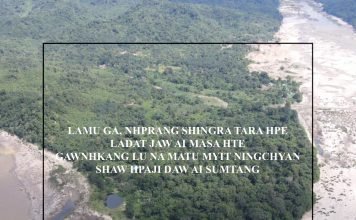Mining companies in the Hpakant and Lone Khin jade mining areas have been operating in each other’s existing licensed plots after the expiration of their licenses, resource watchdog and advocacy group Global Witness and Kachin Development Networking Group (KDNG) said.
Taut Pa Kyal company, 111 company and other firms which are not named have been extracting jade by combining their excavating machines in Kahtan, Ma Yaung and Kayin Chaung which rest in Hpakant and Lone Khine, said U Saw Gyi, a KDNG member who witnessed the excavation.
“The companies whose licences expired joined other companies whose licences are still valid. They are still extracting extensively by combining their machines.
“I saw them. The other people also saw them.
“The companies with valid licences said they have five acres but they are not systematic. They expand to about 30 acres and they are crossing the limits. The residents do not know about that.
“The people are afraid of them because of the legacies of the previous government,” he said at the press conference of the Jade and The Generals film organised by Global Witness at Park Royal Hotel on May 17.
Jade and The Generals focuses on Kachin State in the north of Myanmar, home to some very valuable jade mines, and the site of some of the country’s worst ethnic armed conflicts. Since fighting in Kachin State resumed in 2011, 100,000 people have been displaced and countless lives have been destroyed. Local communities are calling for an end to the fighting and reform of the jade trade which is driving armed conflicts and which is also threatening the peace efforts, the top priority for Daw Aung San Suu Kyi’s government, according to the film.
However, the screening of the film did not go as planned.
Paul Donowitz, team leader in Myanmar of Global Witness, and who spoke at the press conference, said that Jade and The Generals did not receive permission to air.
Mr Donowitz said, “The government needs to resolve the issues that are dividing the people. The gem and jade trade of Kachin State must be managed in such a way that it benefits the people, not men with guns.”
Juman Kubba, senior campaigner of Global Witness, said she found out about the issue when she went to Hpakant for the film.
“We heard about the issue from the workers in Hpakant jade mines. During the meeting with the ministry last Monday, we discussed about operation of machinery with terminated licenses and shared what we heard from the workers,” she said on May 17.
During a period between July 2016 and April 2017, there were over 3900 expirations for gemstone mining sites in the country. Among them, some 1000 jade mining sites which have expired are in Lone Khin, Hpakhant.
Companies are not allowed to mine, once their licence has expired.
For Mr Donowitz, the jade activities play a central role in Myanmar’s peace process.
“Myanmar’s government has promised that its first priority is to end the ethnic armed conflicts,” he stated, adding that, “If it is to succeed, it is crucial that both sides agree on a new approach to the country’s most valuable natural resources. That means getting the men with guns out of the jade trade, and taking concrete efforts to stop natural resources being used to consolidate the military’s grip on power.”
Mr Donowitz told The Myanmar Times that “We’ve heard from multiple sources that companies have been operating in each other’s existing licensed plots when their licenses expire, which we’ve flagged to the government.”
“We encourage further investigation on this issue from both the government and the media,” he said.
He said Global Witness has informed the Ministry of Natural Resources and Environmental Conservation, the Department of Mines and Myanmar Gems Enterprise about the issue.
The NLD has faced calls to reform the troubled multi-billion dollar industry from human rights activists, environmentalists and foreign governments even before taking power last April. Much opposition centres on the threats faced by miners, many of them itinerant workers who have been injured and killed by the hundreds in more than 40 recorded tailings landslides since the beginning of 2015. There is also widespread resentment over the looting of Myanmar’s natural mineral wealth under the current system, particularly its unparalleled jade deposits.
Global Witness, in a 2015 report, estimated that the illicit, untaxed jade trade amounted to US$31 billion in 2014, equal to half of Myanmar’s GDP. It will take until 2021 before permits to all of the 19,000 mining blocks across the country expire.
Translation by Khine Thazin Han and Swe Zin Moe







